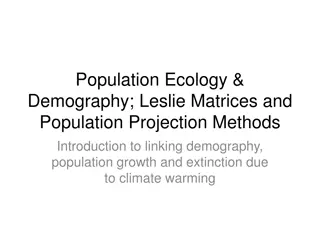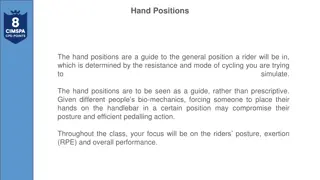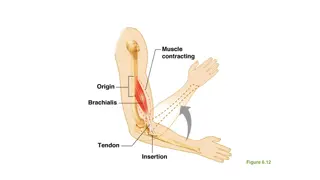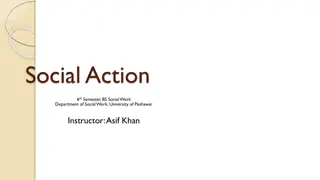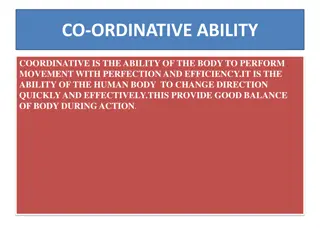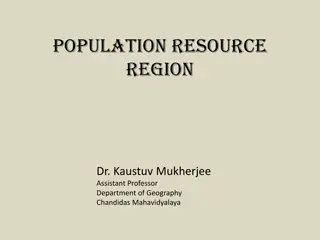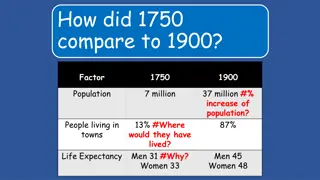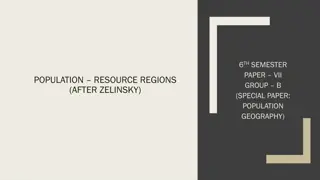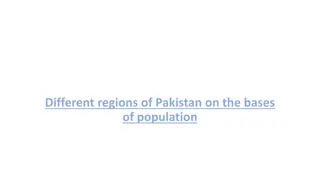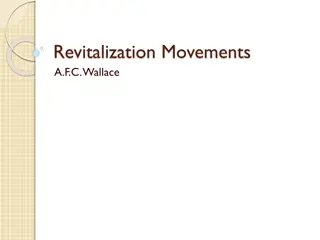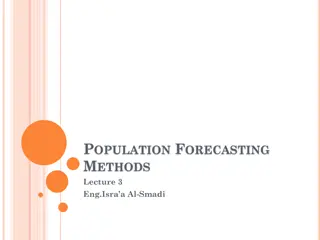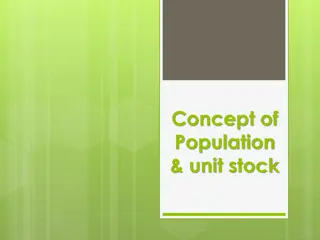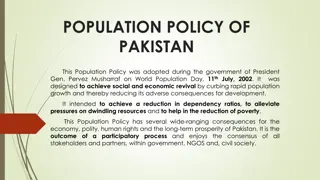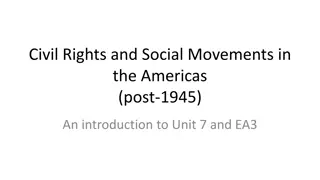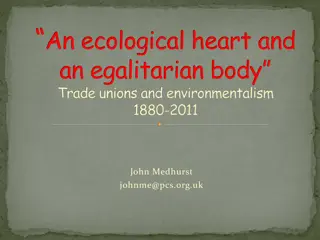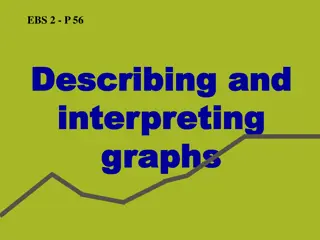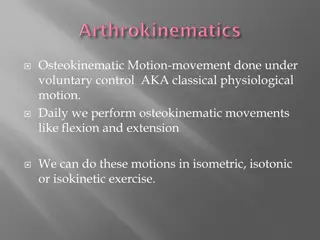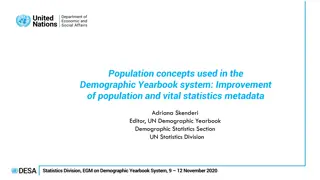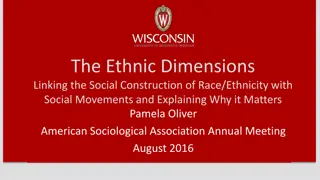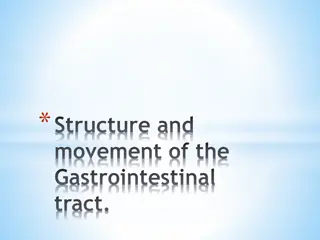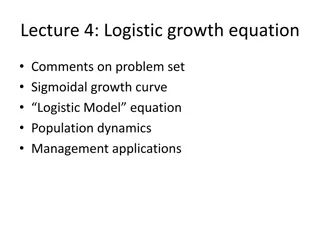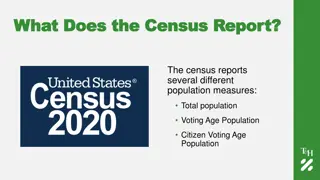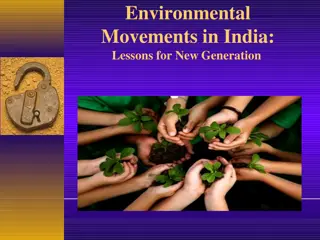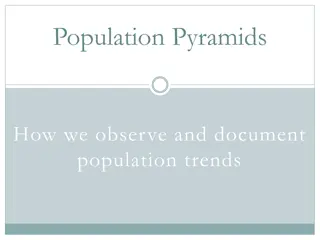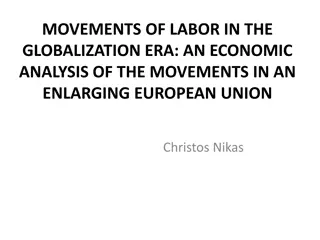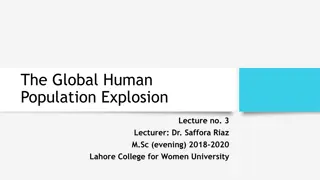Overview of the South African National Population Register
The South African National Population Register (NPR) is a vital system maintained by the Department of Home Affairs. It serves to record and update information on the country's resident population, issue identity documents, and handle related administrative tasks. The NPR has evolved over the years
2 views • 16 slides
Understanding Population Ecology and Demography Through Leslie Matrices
Explore the critical aspects of population ecology and demography, focusing on factors influencing abundance, population growth, regulation, and the impacts of climate change. Learn about population projections, growth models, age-structured populations, and data requirements for estimating populati
4 views • 35 slides
Impact of Human Population Growth on Environment and Welfare
The rapid growth of the human population is placing immense pressure on the environment, leading to increased demand for resources like food, water, and shelter. The effects of human activity on the environment have escalated significantly over the years due to population expansion. High birth rates
0 views • 8 slides
Indoor Cycling: Hand Positions and Core Movements Guide
Indoor cycling involves different hand positions for various riding scenarios, focusing on rider posture and performance. The guide covers Hand Positions 1, 2, and 3, emphasizing relaxation, stability, and intensity adjustment. Additionally, it details core movements like Seated Flats, Standing Flat
8 views • 23 slides
Comprehensive Guide to Body Movements and Special Movements
Explore different types of ordinary body movements such as flexion, extension, abduction, adduction, and circumduction, along with special movements like dorsiflexion, plantar flexion, inversion, eversion, supination, and pronation. Engage with detailed descriptions and visual representations of eac
2 views • 15 slides
Understanding Social Movements: History and Impact
Exploring the background and significance of social movements, this content delves into the evolution of society through various movements like the anti-slavery movement and labor movement. It discusses the types of movements, leaders, followers, tactics, and ways in which social movements can face
3 views • 21 slides
Understanding the Importance of Coordinative Abilities in Sports
Coordinative ability is crucial in sports for performing movements with precision and efficiency. It involves the body's capability to change direction swiftly, ensuring good balance during actions. This ability comprises various types such as orientation, reaction, rhythm, balance, adaptation, coup
1 views • 11 slides
Introduction to Sampling in Statistics
Sampling in statistics involves selecting a subset of individuals from a population to gather information, as it is often impractical to study the entire population. This method helps in estimating population characteristics, although it comes with inherent sampling errors. Parameters represent popu
2 views • 24 slides
Understanding Population-Resource-Region Relationship: A Geographical Perspective
Explore the intricate relationship between population, resources, and regions through a geographical lens. Delve into classifications based on population, resources, and technology, with examples from different countries and regions. Discover the concepts of optimum population, over-population, and
1 views • 11 slides
Understanding Demography: Population Trends and Analysis
Demography is the study of population size, distribution, and composition, encompassing elements such as mortality, natality, migration, and demographic forces. Population census plays a crucial role in collecting and analyzing demographic data, with methods like De Jure and De Facto census. Inter-c
6 views • 21 slides
Comparing 1750 to 1900: Population Growth in Britain
The population of Britain saw a significant increase between 1750 and 1900. In 1750, the population was 7 million, and by 1900, it had grown to 37 million. This represented an 87% increase. The number of people living in towns also rose from 13% to a higher percentage. Factors contributing to this g
0 views • 6 slides
Population Resource Regions and Zelinsky's Classification
Geographers have long studied the relationship between population growth and resource adequacy, leading to the concept of Population Resource Regions (PRR) by W. Zelinsky. Zelinsky identified five types of PRR based on population-resource ratios, ranging from Type A with high resource utilization po
0 views • 8 slides
Population Distribution in Different Regions of Pakistan
The population distribution in Pakistan varies significantly among different regions, with certain provinces like Punjab and Sindh having higher population densities compared to Baluchistan and FATA. The rural areas are also categorized into different population density regions based on the number o
0 views • 14 slides
Understanding Revitalization Movements by A.F.C. Wallace
Explore the concept of revitalization movements as explained by A.F.C. Wallace in his paper published in 1956. The theory delves into deliberate efforts by groups to create new cultures, drawing examples from historical and contemporary contexts. Discover the various theories surrounding revitalizat
0 views • 14 slides
Methods of Population Forecasting for Urban Development
Designing water supply and sanitation schemes for cities requires accurate population forecasting. Factors influencing population changes include births, deaths, migration, and annexation. Various methods like Arithmetic Increase, Geometric Increase, and Ratio Method are used to predict population g
4 views • 24 slides
Understanding the Concept of Population and Unit Stock
The concept of population revolves around all organisms of the same species living in a specific area capable of interbreeding. It is essential to differentiate between sample populations and real populations to accurately study their attributes such as birth rates, death rates, and spatial dimensio
0 views • 15 slides
Population Policy of Pakistan: Vision, Goals, and Strategies
The Population Policy of Pakistan, adopted in 2002, aims to stabilize the population by 2020 through a focus on reducing fertility rates and promoting family planning. The policy outlines goals such as achieving a balance between resources and population, increasing awareness of rapid population gro
0 views • 11 slides
Civil Rights and Social Movements in the Americas Post-1945: An Overview
Explore the history, challenges, and achievements of civil rights and social movements in the Americas post-1945. Learn about the struggles faced by African Americans, Indigenous peoples, feminist movements, Hispanic Americans, and youth culture protests. Discover pivotal moments such as the Montgom
0 views • 16 slides
Influence of Art Movements on Industrial Design History
Baroque, Rococo, and Neoclassicism are art movements that have significantly influenced industrial design history. Baroque is characterized by exaggerated motion and drama, Rococo by playful and ornate designs, and Neoclassicism by simplicity and symmetry. These movements reflect societal trends and
9 views • 19 slides
Introduction to Physiotherapy: Modalities and Exercise Therapy
Physiotherapy, a branch of medical science, utilizes various modalities like electric current, heat/cold, water, and exercises for therapeutic treatment. It includes exercise therapy with active and passive movements, electrotherapy, thermotherapy, hydrotherapy, and massage. Active movements involve
4 views • 42 slides
Historical Overview: Trade Unions, Environmentalism, and Social Justice Movements
Explore the intertwined histories of trade unions, environmentalism, and social justice movements through key events such as the Bryant and May Match Girls' strike and the Triangle Shirtwaist factory fire. Visionaries like William Morris and Edward Carpenter advocated for fair working conditions, co
0 views • 46 slides
Understanding Movements in Graphs: Describing Trends Upward and Downward
Learn to describe and interpret graphs showing upward and downward movements using verbs, nouns, and prepositions. Explore expressions for dramatic changes, stability, and fluctuations in data. Understand how movements in graphs are depicted through various adjectives and adverbs.
0 views • 17 slides
Understanding Joint Motion: Osteokinematic and Arthrokinematic Movements
Joint motion involves osteokinematic movements, which are under voluntary control and include flexion, extension, and more. End-feel sensations like bony, capsular, and springy block indicate different joint conditions. Arthrokinematic motion refers to how joint surfaces move during osteokinematic m
0 views • 17 slides
Improvement of Population and Vital Statistics Metadata in the Demographic Yearbook System
The Demographic Yearbook system focuses on enhancing population and vital statistics metadata to ensure accurate and concise reflection of population concepts across 230+ countries. It involves annual collection of official national population estimates, vital statistics, and UN international travel
0 views • 16 slides
Chile's Regulatory Framework for Capital Movements and Essential Security Measures
Chile's position under the OECD Code of Liberalization of Capital Movements is described along with its commitments in free trade agreements. The regulatory framework for capital movements in Chile allows for liberal participation of foreigners, with certain restrictions in sectors like air transpor
0 views • 21 slides
Understanding the Thoracic Cage and Respiratory Movements in Anatomy Lecture
Professor Ahmed Fathalla Ibrahim, a renowned Professor of Anatomy at King Saud University, covers the components of the thoracic cage, articulations, respiratory movements, and muscles involved in breathing in this informative lecture. Learn about the structure of the thoracic cage, articulations li
0 views • 24 slides
The Significance of Ethnicity and Race in Social Movements
Exploring the interconnectedness between the social construction of race/ethnicity and social movements, this presentation by Pamela Oliver delves into the relevance of race in both majority and minority movements. It emphasizes how race/ethnicity plays a crucial role in structures of domination, po
0 views • 55 slides
Understanding Cults and New Religious Movements
Explore the concepts of cults and new religious movements, comparing them to traditional religions. Delve into the defining characteristics of cults, sects, and controversial religious movements. Consider starting your own cult by examining teachings, rituals, authority, and organization. Reflect on
0 views • 23 slides
Understanding the Structure and Movement of the Gastrointestinal Tract
The gastrointestinal tract (GIT) comprises four layers - Mucosa, Submucosa, Muscularis externa, and Serosa. Each layer plays a crucial role in the digestion process. The GIT undergoes gut motility, including propulsive movements like peristalsis and mixing movements, to facilitate the movement of fo
0 views • 25 slides
Gender Equality and Policy Impact Analysis in Feminist Movements
This presentation delves into the correlation between the strength of autonomous feminist movements and various policy indicators related to gender equality and women empowerment. The study covers a range of factors such as CEDAW ratification, regional agreements, democracy levels, GDP per capita, a
0 views • 14 slides
Understanding Logistic Growth in Population Dynamics
Explore the logistic growth equation and its applications in modeling population dynamics. Dive into the concept of sigmoidal growth curves and the logistic model, which reflects population growth with limits. Learn how to calculate population change using the logistic growth equation and understand
0 views • 26 slides
Overview of Population Measures and District Data from Census Reports
The census reports various population measures including total population, voting age population, and citizen voting age population. The data includes breakdowns by ethnicity for each trustee district. Changes in voting and citizen voting age population percentages are also provided. Data is sourced
0 views • 4 slides
Environmental Movements in India - Overview and Major Movements
Environmental movements in India encompass a range of efforts aimed at conserving the environment, managing natural resources sustainably, and advocating for policy changes. From forest conservation to pollution issues, movements like the Bishnoi and Chipko have made significant impacts on environme
0 views • 24 slides
Environmental Movements in India: Lessons for a Sustainable Future
Environmental movements in India have evolved over time, driven by concerns of unbridled resource exploitation and environmental degradation. The emergence of these movements has been marked by a common interest in protecting the environment through policy changes and collective action. With a focus
0 views • 22 slides
Understanding Population Pyramids for Analyzing Population Trends
Population pyramids are graphical illustrations that showcase the distribution of age groups within a population, segmented by gender. By observing and documenting the patterns of population pyramids, one can discern trends such as rapid growth, slow growth, or negative growth, which are influenced
0 views • 7 slides
Understanding Involuntary and Voluntary Movements in the Body
Involuntary movements, such as contraction and relaxation, are controlled by the autonomic nervous system and are essential for daily functions like heartbeat regulation. On the other hand, voluntary movements involve conscious control over skeletal muscles to regulate body movement. Biblical verses
1 views • 54 slides
Guidelines for Quarantine and Movement Control
Movement control measures are crucial in preventing the transmission of pathogens and maintaining business continuity. This presentation outlines the procedures for permitting and authorizing movements, along with general personnel responsibilities based on FAD-PReP/NAHEMS guidelines. It covers rest
0 views • 28 slides
Maine Workforce and Population Trends Analysis 2014-2024
Maine's workforce and population outlook from 2014 to 2024 reveals a decline in births, resulting in an aging population and workforce imbalance. The state faces challenges due to low birth rates, negative natural population change, and minimal net migration, impacting labor force growth and total p
0 views • 31 slides
Analysis of Labor Movements in the Globalization Era
Contemporary labor movements in the era of globalization differ from previous periods, influenced by factors such as globalization, European integration, the collapse of the socialist system, and economic disparities. The dynamics of migration have evolved, impacting various countries and regions. T
0 views • 29 slides
The Global Human Population Explosion: Causes and Implications
The lecture explores the rapid increase in the global human population post-World War II, analyzing factors such as birth rates, mortality rates, and life expectancy. Various counterarguments are presented, including the debate on population growth benefits, ethical concerns over reproductive interf
0 views • 20 slides

